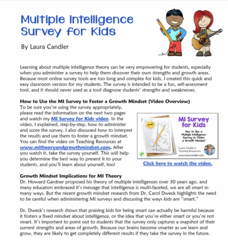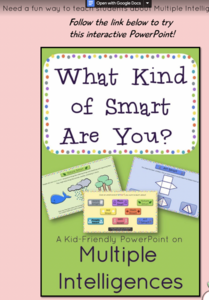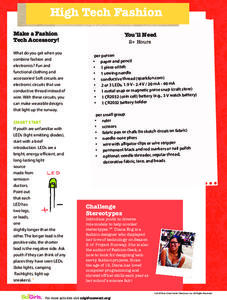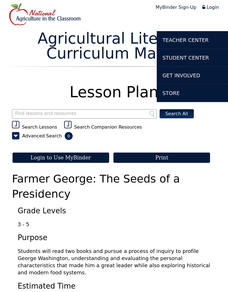Teachers Pay Teachers
Multiple Intelligence Survey for Kids
Scholars rate 24 statements 0-5 then calculate their responses to discover their preferred intelligence and which intelligences require more practice.
Teachers Pay Teachers
What Kind of Smart Are You
Gain insight into the type of learners that fill your classroom. An eight-question survey asks scholars questions about themselves. Using their color-coded answers, they conclude their degree of intelligence in multiple areas—music,...
DocsTeach
Sequencing from Seeds to Harvest
Explore the farm to table experience in a fast-paced lesson on gardening. The activity uses image sequencing to help young scholars understand the process of growing food from seed to harvest. Academics also participate in group...
PBS
High Tech Fashion
Creatively combine clothes and conductors. Pupils learn how to use conductive thread to make electric circuits. They apply the thread to design and build an accessory item with LEDs.
American Chemical Society
Using the Properties of Materials to Improve a Model Boat
Work together to stay afloat. Using a paper boat, pupils connect properties of materials to their usefulness. They test different paper to determine how many pennies each boat will hold and learn that combining materials with different...
Agriculture in the Classroom
Farmer George: The Seeds of a Presidency
Three activities make up a lesson plan that explores the connection between former president George Washington, the farming industry, and leadership. Scholars listen to two read aloud, Farmer George Plants a Nation by Peggy Thomas and...
DocsTeach
Patent Analysis: J.W. Davis and Levi Strauss's Fastening Pocket Openings
Commonplace today, the zipper and button construction of blue jeans was a major innovation. Using the patent for the J.W. Davis and Levi Strauss innovation, individuals comb an image of the fly for clues. Afterward, they discuss its...
DiscoverE
Everyday Engineering: Water Pollution Clean Up
Water, water, everywhere, but pollution is a major problem. Scholars design a filtration device or process that removes dirt and other particles from water. They use various household objects such as marbles, cotton balls, or coffee...
DiscoverE
DiscoverE Challenge: Pen Factory
Manufacture a great lesson on industrial manufacturing. A fun resource has learners use the production of pens to consider how assembly lines work. They write out a set of instructions for assembling a pen, test it out, then determine if...
National Science Teaching Association
Why Do We All Have to Stay Home?
Learners, especially young ones, might be confused about why or frustrated that we have to stay at home. Help answer questions and calm emotions with a nine-page resource that details topics regarding the COVID-19 pandemic.
Museum of Science
Solar Cooker
A warm, sunny day is perfect for eating great food and learning about science at the same time. Future engineers build solar cookers to prepare food using the Sun's rays. They learn how energy converts from solar energy to thermal energy.
Museum of Science
Wind Turbine
Let the energy blow. Using mostly easily found material such as PVC pipe and fans, pupils build wind turbines. Scholars connect a multimeter to an electric motor to determine the amount of energy generated by their designs. Learners then...
NASA
Providing Light for Your Plants
Using a guided instructional activity, pupils learn about what it takes to make a circuit along with a switch. They build a complete circuit under the direction from the teacher and identify each of the elements of the circuit. Scholars...
Teaching Tolerance
Puppet Show
It's a play, it's a story, it's a puppet show! A lively resource provides academics with a creative outlet to express their views on diversity and social justice. Scholars are responsible for writing, creating, and performing a puppet...
University of Waikato
Growing Soil Microbes
View how microbes grow in soil. Class members first create a Winogradsky column to grow bacteria. They then set up the column of mud in a plastic bottle and include a food source for the microbes and observe the column of mud over the...
Missouri Department of Elementary
Fly Your Kite
Encourage scholars to become a productive community member with a kite-themed lesson. Following a review and discussion, learners complete a Venn diagram that displays the connection between character traits needed to make a home and...
National Woman's History Museum
Getting with the Program
A seven-step lesson introduces the emergence of computer sciences and the contributions women made to the profession after World War II. Several science experiments offer pupils a hands-on learning experience that showcases parabolas,...
Purdue University
Eco-llapse
A balanced ecosystem doesn't mean balanced populations. Budding scientists complete a series of activities to learn about the relationship between producers and consumers in an ecosystem. They complete the wildlife conservation...
Purdue University
Mammals and Ecosystems
Mammals have unique interactions with their ecosystems. Using a multi-part lesson, learners research local mammals using recommended websites and use their findings to create their own paper ecosystems including appropriate mammals. They...
Purdue University
Ashes to Ashes: We All Grow Up
Ecosystems are constantly changing whether people notice or not. An inquiry-based lesson examines types of ecosystem changes and how they relate to wildlife conservation. Learners classify changes as succession and disturbance using a...
Purdue University
Reptiles, Amphibians, and the Scientific Method
What do a reptile and an amphibian have in common? A three-part lesson allows scholars to investigate the similarities and differences between the two types of animals by identifying specific body parts. The lesson highlights the...
Polk Bros Foundation
Chicago: Choices and Changes
Chicago, a city that is ever changing. A thought-provoking lesson, geared toward third-grade social studies, explains how the city of Chicago has changed over time. It discusses important leaders to the founding of the city, like Daniel...
Purdue University
What a Waste of Food!
Follow the life of an apple from harvest to the consumer. A three-part lesson describes the different steps to get an apple from the farmer to your kitchen and the approximate waste that happens at each step. They discuss the process and...
Purdue University
Food Waste Solutions
Easy doesn't always mean better. In an era with pre-packaged everything, learners consider the environmental impact of the convenient trend. They critique the packaging of food and how waste impacts cost and then look for solutions.

























